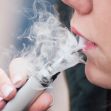The vaping industry is having a bad autumn. Between mysterious lung illnesses and the skyrocketing rate of teen e-cigarette use, e-cigarette makers like Juul are seeing massive losses. Several states and cities are now developing laws to limit the growing popularity of vaping among children and teens, while the federal government’s enthusiasm for national laws limiting vaping has diminished markedly in the face of political pressure from industry lobbying efforts.
The use of e-cigarettes and vape pens has exploded in popularity in recent years. Juul, the e-cigarette whose sales constitute 70% of the e-cigarette and vape market, was originally developed as a tool to help people quit smoking by offering them a healthier alternative. It was not until 2016, years after many vapes and e-cigarettes hit the market, that the Food and Drug Administration obtained the power to regulate these products. As a result, many have never received FDA approval and will need to apply for and obtain that approval by May 2020 if they wish to remain on the market.
Vaping has found an especially fertile market in America’s adolescents and teens. A survey conducted by the CDC found that 21% of US high school students had used an e-cigarette in 2018, which was a 78% increase over data from the previous year, and a more recent survey shows that the share of high schoolers using vape devices has risen to over 27.5%. The survey also found that five million kids in middle and high school use vape pens or e-cigarettes. Of the high school students polled, 68% used flavored cartridges when vaping. While Juul and other e-cigarette manufacturers claim that they have never marketed their products to underage users, the companies have made heavy use of social media advertising campaigns and continue to profit from the sales of vape juice flavors such as cotton candy, blackberry crumble, cannoli, and butterscotch.
In September 2019, the White House announced that it was planning to enact a ban of any vape or e-cigarette product that was flavored like anything other than tobacco. However, the industry and lobbying group pushback to the proposed ban appeared to intimidate the executive branch from enacting such a law. Trump scheduled a meeting with both industry and health advocacy groups on November 22, 2019 to further explore a potential ban, but so far the administration has gotten no closer to a ban. Political pressure from lobbying groups appears to have had an impact on their enthusiasm for such a ban. One representative from Americans for Tax Reform, Paul Blair, wrote an editorial claiming that “banning flavored e-cigarettes might cost Trump re-election.” Industry groups have also been widely distributing numbers on the massive losses the field will take should flavors be banned, with one group claiming that the industry would lose over $8 billion in sales in the event of a ban on e-cigarette flavors.
While the federal government has yet to take action, cities and states have begun enacting laws limiting the sales of e-cigarettes and flavored cartridges so as to stem the rise in e-cigarette use among children and teens. So far, Washington, Montana, Oregon, Michigan, New York, Massachusetts, and Rhode Island have enacted some form of ban on flavored vaping products. Additionally, San Francisco Mayor London Breed recently signed a law that will ban all e-cigarettes from being sold in the city beginning in 2020. The City of Beverly Hills has passed a similar ban to take effect in 2021. While the existing bans are largely temporary, Massachusetts’ state legislature recently passed a law that would give it the nation’s toughest restrictions on tobacco sales. Not only would flavored e-cigarettes become illegal, but the sale of menthol cigarettes would also be banned, and all other e-cigarette sales would become subject to a 75% excise tax. Illinois lawmakers are currently considering a similar bill.






